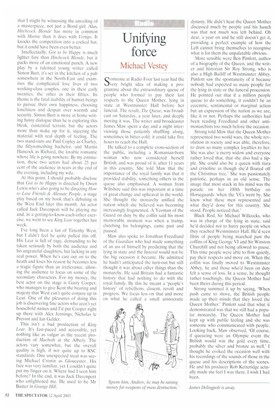Unifying force
Michael Vestey
Someone at Radio Four last year had the very bright idea of making a programme about the extraordinary queue of people who formed to pay their last respects to the Queen Mother, lying in state at Westminster Hall before her funeral. The result, The Queue, was broadcast on Saturday, a year later, and deeply moving it was. The writer and broadcaster James Maw spent a day and a night interviewing those patiently shuffling along, sometimes in bitter cold; it could take five hours to reach the Hall.
He talked to a complete cross-section of the public, including a Romanian-born woman who now considered herself British, and was proud of it, after 11 years in this country. She told Maw that the importance of the royal family was that it provided stability, something others in the queue also emphasised. A woman from Wiltshire said this was important at a time of great change and upheaval in the world. She thought the monarchy unified the nation which she believed was becoming increasingly fragmented. A Yeoman of the Guard on duty by the coffin said his most memorable moment was when a tramp, clutching his belongings, came past and paused.
Maw also spoke to Jonathan Freedland of the Guardian who had made something of an ass of himself by predicting that the lying in state and the funeral would not be the big occasion it became. He admitted he hadn't anticipated the turn-out but still thought it was about other things than the monarchy. He said Britain had a fantastic history that had nothing to do with the royal family. By this he meant a 'people's history' of rebellions, dissent, revolt and progress. We focus less on that and more on what he called a small aristocratic
dynasty. He didn't hear the Queen Mother discussed much by people and his hunch was that not much was left behind. Oh dear, a year on and he still doesn't get it, providing a perfect example of how the Left cannot bring themselves to recognise what is for them the unpalatable obvious.
More sensible were Ben Pimlott, author of a biography of the Queen, and the writer and historian Sir Roy Strong, who is also a High Bailiff of Westminster Abbey. Pimlott saw the spontaneity of it because nobody had expected so many people for the lying in state or the funeral procession. He pointed out that if a million people queue to do something, it couldn't be an eccentric, sentimental or marginal action but an expression of the nation as we are, like it or not. Perhaps the authorities had been reading Freedland and other antimonarchists too much before the occasion.
Strong told Maw that the Queen Mother represented two world wars, the whole revolution in society and was able, therefore, to draw so many complex loyalties to her. She was also 'a merry widow and everyone rather loved that, that she also had a tipple. She could also be a queen with tiara and crinoline as though she'd floated off the Christmas tree.' She was passionately patriotic, perhaps in an old sense. The image that most stuck in his mind was the parade on her 100th birthday on Horseguards 'when the VCs went by. She knew what these men represented and what they'd done for this country. She stood. People noticed that.'
Black Rod, Sir Michael Willcocks, who was in charge of the lying in state, said he'd decided not to hurry people on when they reached Westminster Hall. He'd seen films of people being marched past the coffins of King George VI and Sir Winston Churchill and not being allowed to pause. This time people were able to flow quietly, pay their respects and move on. When the coffin was finally moved to Westminster Abbey, he and those who'd been on duty felt a sense of loss. In a sense, he thought rather touchingly, the Queen Mother had been theirs during this period.
Strong summed it up by saying, 'When push came to shove, the British people made up their minds that they loved the Queen Mother.' Pimlott said that what it demonstrated was that we still had a popular monarchy. The Queen Mother had kept up with public feeling and she was someone who communicated with people. Looking back, Maw observed, 'Of course, if queueing were an Olympic event the British would win the gold every time, probably the silver and bronze as well.' I thought he evoked the occasion well with his recordings of the sounds of those in the queue and his descriptions of the scenes. He and his producer Rob Ketteridge actually made me feel I was there. I wish I had been.
James Delingpole is away.


































































 Previous page
Previous page